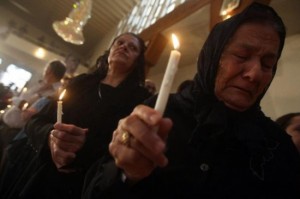 I remember a couple of years ago seeing some TV reports about a heartbreaking situation in Somalia and Kenya that continue today. The commentator said, “We must warn you. Some of the images you are about to see are quite disturbing.”
I remember a couple of years ago seeing some TV reports about a heartbreaking situation in Somalia and Kenya that continue today. The commentator said, “We must warn you. Some of the images you are about to see are quite disturbing.”
We proceed to see starving infants and children with distended tummies, crying children who didn’t know where their next drink of water would come from, women who had several boys and girls clinging to them as they waited for aid from another country that provided them a meager bit to eat.
I didn’t know what to think then as I saw that or read about the famine and drought in those African countries, situations complicated by civil war and soldiers who don’t seem to think twice about raping some of those women right in front of the children. Just as I don’t know what to think when I see the images or read the news about what the people of Syria are enduring.
All of those images a world away, it seems, so far removed from my life here in middle-class, Midwestern America. Indeed, all of that disturbs my thoughts and my heart. But beyond that, I am lost as to what it all means for me.
It makes me think of Psalm 126, that reads in part: “Deliver us, O Lord, from our bondage as streams in dry land.”
I don’t comprehend that verse because I never have been in such a desert where my thirst was that great, where I would know amazing gratitude by even one mouthful of water. I can’t fathom what it must be like to walk hundreds of miles in searing heat as I hope to find a better life for myself and my children, a journey that doesn’t end up in a civilized country with plenty of support for my family but rather a sojourn that ends in a refugee camp planned to handle 90,000 people but actually filled with more than 400,000 people. A place where people die every day, most of them young children who never have a chance.
I will say I feel hungry sometimes, but I’m not really hungry — not when I eat at least one filling meal a day.
I will say I feel thirsty sometimes, but I’m not really thirsty — not when I can turn on any nearby faucet for a drink of water or have enough money to buy a glass of lemonade.
I might say I’m hot or I’m cold, but I don’t feel overwhelmingly that way — not when I can wear one of my coats or turn up the air conditioning.
So how are we supposed to respond to people experiencing something we can’t even imagine? I feel so helpless when I see those images. I’m open to suggestions, frankly. The thing is, I don’t know that I could drop everything in my life here in order to go there to help; besides, what would I do if I actually went there? I could give my money, but how much actually can help?
I feel paralyzed.
I can pray. I must pray. I must confess, though, that I have my doubts as to what extent God will work miracles there. Jesus said the poor will be with us always. So, I believe, will drought and famine and war. Can our prayers really make any more of a difference than a drop of water on a parched tongue?
I don’t know the answer to that.
Those images should make me think hard about my own life. I might at times say I wish I had more money, but what would it buy? Dinner in a restaurant. Improvements to my house. Higher education for my children. A nicer, newer car. A luxury that I don’t really need.
What we need are the essentials of food and water and safety — things the refugee men, women and children of Somalia, Kenya and Syria don’t have. Generally, most of us in this country have easy access to those things. Perhaps those images can make me a more grateful person, a more giving person, someone who loses an attachment to the things in life that don’t matter so much when all is said and done.
Maybe the images should make me feel more grateful.
But still, I wonder: What can I do?
My thoughts are motivated by the words in the letter of James, chapter two: “If a brother or sister has nothing to wear and has no food for the day, and one of you says to them, ‘Go in peace, keep warm, and eat well,’ but you do not give them the necessities of the body, what good is it?”
A while back, I heard someone talking about making a mission trip to another country in order to help impoverished people there build a house or a school or a hospital or just something to lift them a little out of their poverty. Another person in the conversation said, “Why should we help people in other countries when we have people in this country who need help?”
Fair question. But shouldn’t we strive to help people here and abroad? If we don’t help in some way, who will?
Haunted by those images from Africa, what can you and I do?



